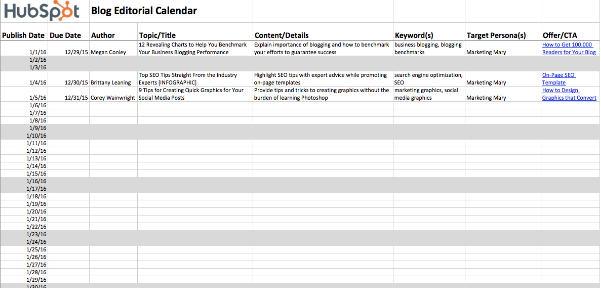One of the chief difficulties that every marketing department faces is generating content. It’s why only 42% of marketers claim that they’re effective content marketers and 16% state that they’re not effective at all (CMI). Part of the problem is how much content a marketing team needs to create, and the other part is the type of content that needs to be created. For example, let’s say your marketing team has to create at least one piece of content every day. Already, that’s time-consuming, but it can also be frustrating and a waste of time if you don’t know what type of content you need to create. That’s where an editorial content calendar can be invaluable.
How To Create a Content Calendar
A content calendar doesn’t have to be complicated. Many marketing teams create it right in Microsoft Excel with various columns and rows covering everything you need, from who you’re writing the content for to where you’ll be publishing it. To get started, you’ll first need to answer a few questions:
- #1. When is the content due?
- #2. When should the content be published?
- #3. What type of content is it?
- #4. Who is creating the content?
- #5. What topic does the content cover?
- #6. Who is the content for?
HubSpot offers an awesome FREE editorial calendar template that can help get you started. Their template comes with a few views to make it as easy as possible to use. Their blog view gives you an in-depth look at when your blog is due, who’s responsible for writing it, the title, topic, keywords, target audience, and CTA. Then, there’s the monthly overview, which quickly reveals what type of content is due each day based on a color-coded key. This view is especially valuable for planning ahead.


Whether you have a large marketing staff or a team of one, a content calendar is an invaluable tool for your business. Here’s why.
Goal-Focused Approach
A content calendar keeps you from throwing around content willy-nilly so that you can take a more focused approach to your marketing. It does this by forcing you to think about the main topics that relate to your business and your audience. A well-done calendar divides your blogs into three to four goal-focused topics.
For example, if one of your marketing goals is to increase interest in your software, then you’ll want one of your topics to be focused on “all about your software.” This is a wide-ranging topic that can include everything from “how-to” articles to example user videos, customer success story white papers, and more.
Keep on Track
It’s hard to forget what you write down. If you have a content calendar, there’s no guessing or trying to remember what content is needed that day or where it’s needed. This will ensure that you create the necessary content that you need every day and that you hit every topic and audience that is necessary for your success.
A content calendar can also help you get into a routine of writing content. If you know what you need to do every day, it’s easier to hold you accountable for the blogs, newsletters, social media, and other content that is a priority.
Plan Ahead
A content calendar will keep you from forgetting important dates, seasons, campaigns, and goals. It’s particularly helpful for helping you gather all the content creation collateral you need for each campaign at least several weeks, if not months, in advance. This will keep you from scrambling around the holidays or right before a new product release.
Consistency
Have you ever visited a company website to read the blog only to feel like every blog is in a different voice and written for a different company? It’s disconcerting, to say the least. A content calendar coordinates your marketing efforts, so your business uses one distinct voice and focuses on pre-approved goals.
To help you stay as consistent as possible, we recommend that you include style guidance within your calendar. You can create another excel page that talks about branding and information such as photo styles, language, tone, etc. The more consistent your brand, the better.
Shared Workload
If you struggle to get more than one or two individuals to contribute to creating your content, your calendar can simplify the issue by assigning content to whoever would be best to write it. For example, if you want to create a sales blog within your company-wide calendar, you can assign that due date to your sales team lead.
Even better, you can use the calendar to assign work to outside sources like nDash. Once you see how much and what type of content your business needs to create to be successful, you can start deciding what makes sense to create in-house and what makes sense to outsource. In many cases, the time you’ll save by assigning content to professional writers will make up for any additional cost.
Save Time
Use your time more effectively with a content calendar. Instead of trying to come up with a topic and audience on the fly, your calendar has it all pre-laid out for you, so all you have to do is create the content when you need it. The calendar will also help you save time by telling you where to publish it and how it will work into your overall marketing goals, eliminating the guesswork.
Organized Across Platforms
Are you great at creating blogs, but you fall behind on everything else? A content calendar can help ensure that you’re sharing the appropriate content and the right amount of content on every platform. From blog posts to email newsletters and social media updates on Twitter, Facebook, Instagram, and YouTube, your calendar can cover every platform that’s important to your business.
Even better, your calendar can help you use your content to its full potential. For example, you should also share your blog should through your email and on social media. With a calendar, you can quickly plan out exactly when and how you do this across your other important platforms.
There are few tools more valuable to your marketing strategy than a full content calendar. Make it a habit to open your content calendar every morning before you do anything else, and discover what a difference it can make in your content marketing strategy.
And if you need help creating a solid content calendar, contact nDash. Our professional writers have years of experience creating exceptional content and can help you plan out your marketing.
 Editor’s note: This post is by nDash community member Kelly Vo. Kelly writes a variety of business articles and website copy on topics such as Cloud computing, business safety, B2B & B2C marketing, entrepreneurship, e-commerce, and more. To learn more about Kelly, or to have her write for your brand, check out her nDash profile page.
Editor’s note: This post is by nDash community member Kelly Vo. Kelly writes a variety of business articles and website copy on topics such as Cloud computing, business safety, B2B & B2C marketing, entrepreneurship, e-commerce, and more. To learn more about Kelly, or to have her write for your brand, check out her nDash profile page.
